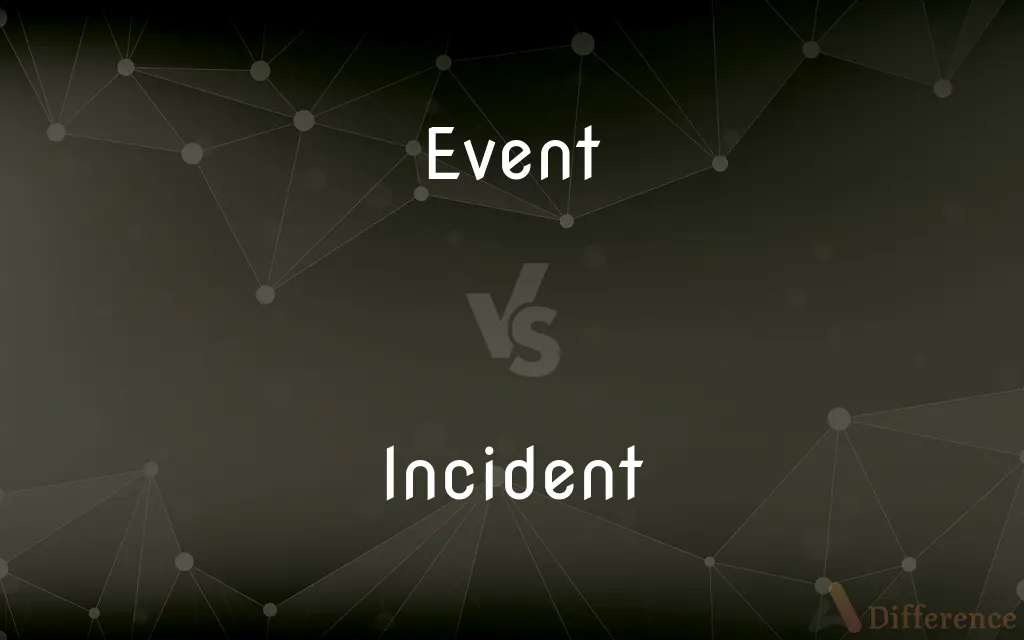Event vs. Incident — What's the Difference?
Edited by Tayyaba Rehman — By Maham Liaqat — Updated on March 11, 2024
An event is any significant occurrence that can be planned or unplanned, while an incident specifically refers to an unplanned event, often with negative consequences.

Difference Between Event and Incident
Table of Contents
ADVERTISEMENT
Key Differences
An event encompasses a wide range of occurrences, from formal gatherings like conferences and weddings to natural phenomena such as earthquakes or solar eclipses. Events can be anticipated and organized with a specific purpose in mind, or they can happen unexpectedly without any forewarning. For instance, a music festival is a planned event that brings people together for entertainment, whereas a sudden thunderstorm during the festival would be an unplanned event. An incident, however, is more narrowly defined as an event that disrupts normal operations or poses a threat to safety, security, or stability. Incidents include accidents, security breaches, and system failures, often triggering a response to mitigate their effects. For example, a fire breaking out in an office building is an incident that would require an immediate emergency response.
Events are characterized by their diversity and can have positive, neutral, or negative outcomes depending on their nature and the perspective of the individuals involved. They play a significant role in cultural, social, and personal lives, marking occasions for celebration, commemoration, or observation. Incidents, by their very definition, are primarily negative and require intervention to resolve and prevent future occurrences. They can lead to loss of life, damage to property, or disruption of services, making incident management a critical component of organizational and public safety protocols.
The planning and management of events focus on logistics, engagement, and achieving specific objectives, such as fundraising, awareness, or entertainment. This involves careful coordination of resources, venues, and participants to ensure the event's success and the satisfaction of all stakeholders. In contrast, incident management involves preparedness, response, and recovery strategies designed to efficiently address and mitigate the impact of incidents. This includes emergency services, risk assessments, and contingency planning to protect people, assets, and the environment from harm.
While events can be open to the public or private, inviting specific participants, incidents often affect a broader range of individuals, including those directly involved, emergency responders, and sometimes the wider community. The aftermath of an incident may also lead to investigations, regulatory changes, and the implementation of new safety measures to prevent similar occurrences in the future.
The distinction between an event and an incident lies in their implications and the responses they necessitate. While events enrich our lives and cultures, offering opportunities for connection, learning, and enjoyment, incidents challenge us to improve our resilience, safety protocols, and crisis management capabilities to safeguard against adverse effects.
ADVERTISEMENT
Comparison Chart
Definition
A significant occurrence, planned or unplanned.
An unplanned event with negative consequences.
Nature
Can be positive, neutral, or negative.
Primarily negative.
Purpose
Varied, including celebration, awareness, entertainment.
Requires intervention and resolution.
Management
Focuses on logistics, engagement, objectives.
Involves preparedness, response, recovery.
Impact
Diverse, depending on type and scope.
Often involves loss, damage, or disruption.
Compare with Definitions
Event
Cultural Significance
National holidays are events that reflect the cultural values of a society.
Incident
Negative Outcomes
The chemical spill was an environmental incident requiring immediate cleanup.
Event
Broad Occurrences
The annual marathon is a major event that attracts participants worldwide.
Incident
Emergency Response
Emergency teams were dispatched to the site of the traffic incident.
Event
Natural Phenomena
The meteor shower was a spectacular astronomical event observed by many.
Incident
Investigation and Learning
The incident led to a thorough investigation to prevent future occurrences.
Event
Planned Activities
The company's product launch event was attended by industry leaders.
Incident
Disruption of Normalcy
The power outage was an incident that affected thousands of homes and businesses.
Event
Personal Milestones
Graduation ceremonies are significant personal events marking academic achievements.
Incident
Safety and Security Breaches
The data breach incident compromised the personal information of numerous users.
Event
Something that takes place, especially a significant occurrence.
Incident
A particular occurrence, especially one of minor importance.
Event
A social gathering or activity
The fundraising event was held in the ballroom.
Incident
An event in a narrative or drama.
Event
(Sports) A contest in a sports competition, such as a meet
Swimming events.
Incident
A usually violent or disruptive occurrence, especially one that precipitates a larger crisis
An international incident that provoked war.
Event
(Physics) A phenomenon or occurrence located at a single point in spacetime, regarded as the fundamental observational entity in relativity theory.
Incident
An occurrence that interrupts normal procedure or functioning; a mishap
The plane landed without incident.
Event
(Archaic) A final result; an outcome.
Incident
(Law) Something contingent on or related to something else.
Event
An occurrence; something that happens.
Incident
Tending to arise or occur as a result or accompaniment
"There is a professional melancholy ... incident to the occupation of a tailor" (Charles Lamb).
Event
A prearranged social activity (function, etc.)
I went to an event in San Francisco last week.
Where will the event be held?
Incident
(Law) Related to or dependent on another thing.
Event
One of several contests that combine to make up a competition.
Incident
(Physics) Falling upon or striking a surface
Incident radiation.
Event
An end result; an outcome (now chiefly in phrases).
In the event, he turned out to have what I needed anyway.
Incident
An event or occurrence.
She could not recall the time of the incident.
It was an incident that he hoped to forget.
The suspect was released without further incident.
Event
(physics) A point in spacetime having three spatial coordinates and one temporal coordinate.
Incident
A (relatively minor) event that is incidental to, or related to others.
Event
(computing) A possible action that the user can perform that is monitored by an application or the operating system (event listener). When an event occurs an event handler is called which performs a specific task.
Incident
An event that causes or may cause an interruption or a crisis, such as a workplace illness or a software error.
Event
(probability theory) A set of some of the possible outcomes; a subset of the sample space.
If is a random variable representing the toss of a six-sided die, then its sample space could be denoted as {1,2,3,4,5,6}. Examples of events could be: , , and .
Incident
Arising as the result of an event, inherent.
Event
(obsolete) An affair in hand; business; enterprise.
Incident
Falling on or striking a surface.
The incident light illuminated the surface.
Event
(medicine) An episode of severe health conditions.
Incident
Coming or happening accidentally; not in the usual course of things; not in connection with the main design; not according to expectation; casual; fortuitous.
Event
(obsolete) To occur, take place.
Incident
Liable to happen; apt to occur; befalling; hence, naturally happening or appertaining.
Event
To be emitted or breathed out; to evaporate.
Incident
(legal) Dependent upon, or appertaining to, another thing, called the principal.
Event
To expose to the air, ventilate.
Incident
Falling or striking upon, as a ray of light upon a reflecting surface.
Event
That which comes, arrives, or happens; that which falls out; any incident, good or bad.
To watch quietly the course of events.
There is one event to the righteous, and to the wicked.
Incident
Coming or happening accidentally; not in the usual course of things; not in connection with the main design; not according to expectation; casual; fortuitous.
As the ordinary course of common affairs is disposed of by general laws, so likewise men's rarer incident necessities and utilities should be with special equity considered.
Event
An affair in hand; business; enterprise.
Incident
Liable to happen; apt to occur; befalling; hence, naturally happening or appertaining.
All chances incident to man's frail life.
The studies incident to his profession.
Event
The consequence of anything; the issue; conclusion; result; that in which an action, operation, or series of operations, terminates.
Dark doubts between the promise and event.
Incident
Dependent upon, or appertaining to, another thing, called the principal.
Event
To break forth.
Incident
That which falls out or takes place; an event; casualty; occurrence.
Event
Something that happens at a given place and time
Incident
That which happens aside from the main design; an accidental or subordinate action or event.
No person, no incident, in a play but must be of use to carry on the main design.
Event
A special set of circumstances;
In that event, the first possibility is excluded
It may rain in which case the picnic will be canceled
Incident
Something appertaining to, passing with, or depending on, another, called the principal.
Event
A phenomenon located at a single point in space-time; the fundamental observational entity in relativity theory
Incident
A single distinct event
Event
A phenomenon that follows and is caused by some previous phenomenon;
The magnetic effect was greater when the rod was lengthwise
His decision had depressing consequences for business
He acted very wise after the event
Incident
A public disturbance;
The police investigated an incident at the bus station
Incident
Falling or striking on something
Incident
(sometimes followed by `to') minor or casual or subordinate in significance or nature or occurring as a chance concomitant or consequence;
Incidental expenses
The road will bring other incidental advantages
Extra duties incidental to the job
Labor problems incidental to a rapid expansion
Confusion incidental to a quick change
Common Curiosities
What differentiates an event from an incident?
An event is any significant occurrence, while an incident is specifically an unplanned event with negative consequences.
Why is incident management important?
Incident management is crucial to quickly address and resolve issues, minimizing harm and preventing future incidents.
Are all negative occurrences considered incidents?
Generally, yes, if they disrupt normal operations or pose a threat to safety and require intervention.
How are incidents managed differently from events?
Incidents require immediate response and mitigation efforts, whereas events are managed to meet objectives and ensure participant satisfaction.
What role does communication play in managing incidents and events?
Effective communication is vital in both scenarios: in events, to engage participants and manage logistics; in incidents, to coordinate response efforts and inform stakeholders.
Can the same strategies be used for event and incident management?
While some logistical aspects may overlap, the strategies differ significantly in focus, with event management aiming for success and incident management aiming for resolution and recovery.
Can an event become an incident?
Yes, if an event leads to negative outcomes or disrupts normal operations, it can also be classified as an incident.
How do public events prepare for potential incidents?
Public events often have contingency plans, emergency services on standby, and risk assessments to manage potential incidents.
What long-term effects can incidents have on organizations and communities?
Incidents can lead to regulatory changes, improved safety measures, and heightened awareness, impacting long-term operations and community standards.
How do cultural perspectives affect the classification of events and incidents?
Cultural values and norms can influence what is considered significant or negative, affecting the perception of events and incidents.
Share Your Discovery

Previous Comparison
Stuart vs. Stewart
Next Comparison
Transfiguration vs. TransformationAuthor Spotlight
Written by
Maham LiaqatEdited by
Tayyaba RehmanTayyaba Rehman is a distinguished writer, currently serving as a primary contributor to askdifference.com. As a researcher in semantics and etymology, Tayyaba's passion for the complexity of languages and their distinctions has found a perfect home on the platform. Tayyaba delves into the intricacies of language, distinguishing between commonly confused words and phrases, thereby providing clarity for readers worldwide.
















































